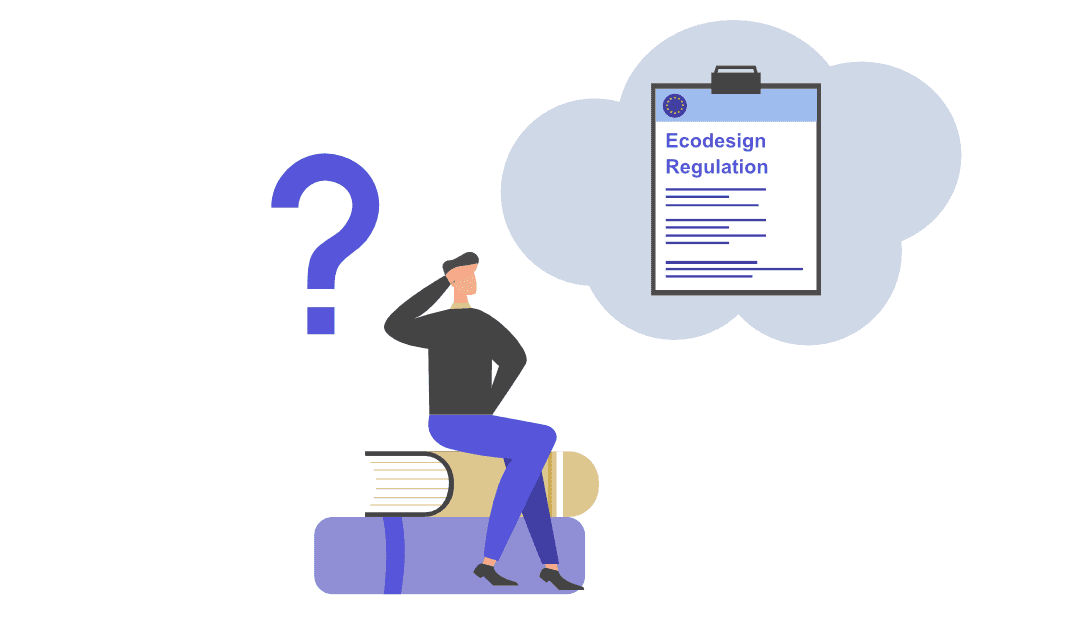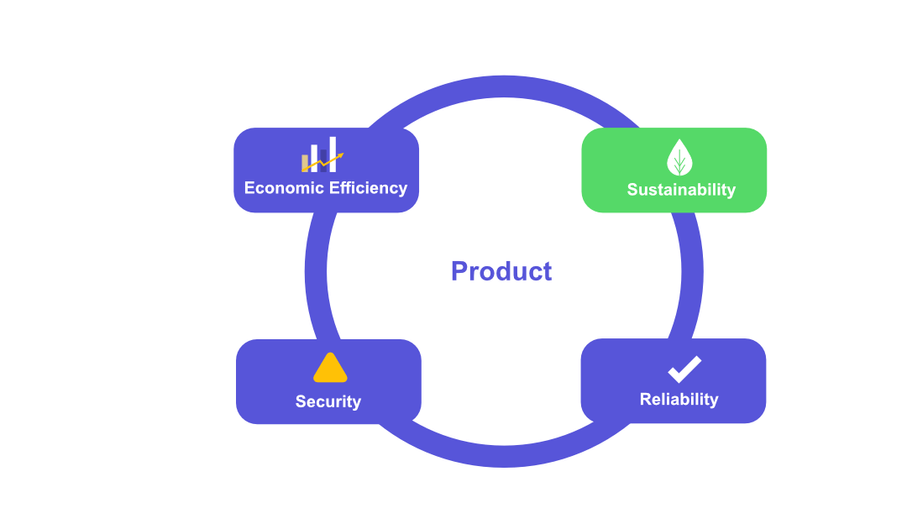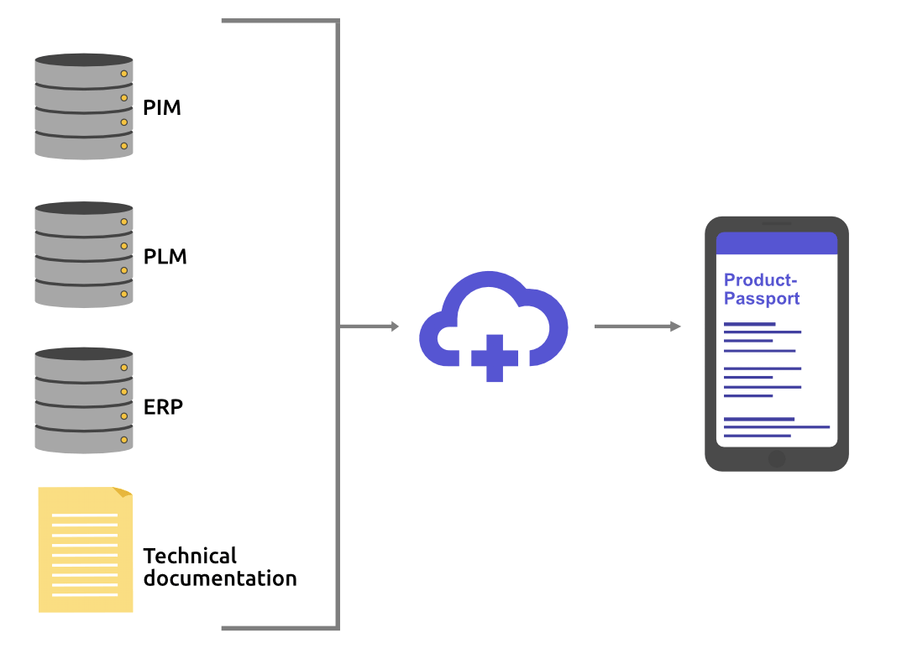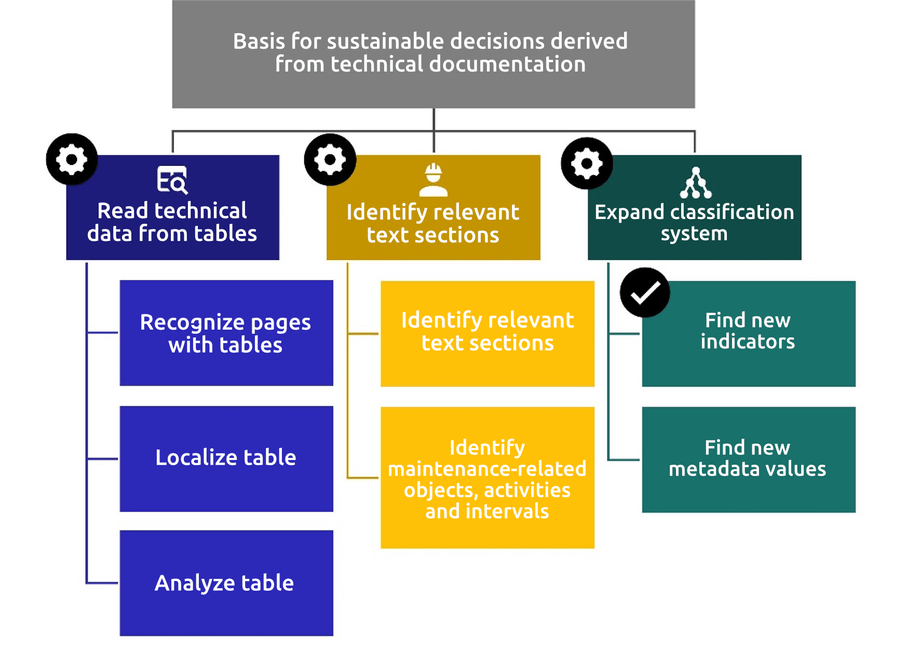The Ecodesign Regulation – the legal basis for the Digital Product Pass (DPP)

von Marlene Groß
Dez. 18, 2024

What does the new Ecodesign Regulation mean? • Graphic: plusmeta, Viktoria Kurpas/Shutterstock.com The new EU Ecodesign Regulation, which came into force on July 18, 2024, marks a significant step towards more sustainable products. Manufacturers are facing stricter requirements that aim to minimize the environmental impact of products.
Some of the key changes include:
- Longer lifespan of products through more robust designs.
- Increase in energy and resource efficiency during production and use.
- Improvement of the repair and recyclability as well as durability and upgradability of products.
- Higher proportion of recycled materials in production.
- Available product information in the form of a digital product passport (DPP).
These guidelines are not only intended to reduce environmental pollution, but also to strengthen competition for sustainable products in the EU internal market and to make companies with a sustainable focus more competitive globally.
But what do these changes mean for manufacturers? What steps are required to meet the new guidelines and how can companies ensure that their products meet the requirements of the regulation? In this blog post, you will learn how the Ecodesign Directive is changing the rules for manufacturers and how exactly plusmeta can help turn these challenges into opportunities.
Ecodesign: Thinking sustainability from the outset
Ecodesign means taking ecological aspects into account early on in the product development process. In addition to classic criteria such as cost-effectiveness, safety and reliability, ecodesign considers the environment as a central requirement. Total product life cycles are taken into account – from material extraction, production and use to disposal or recycling.
The Ecodesign approach • Graphic: plusmeta, Viktoria Kurpas/Shutterstock.com
The Digital Product Passport
A central element of the new regulation is the digital product passport. The DPP is a data set that summarizes various information about a product and is intended to enable transparent traceability over the entire life cycle of a product. It should be provided in electronic form and easily accessible via QR codes or other globally unique, machine-readable IDs.
The DPP provides comprehensive information on:
- Components and materials
- Chemical substances
- Repairability and spare parts
- Disposal and recycling
The standardized presentation of environmentally relevant data in a uniform format is intended to make it easier for all players in the supply and value chain to promote a circular economy. The Digital Product Passport plays a central role here: It provides reliable information for consumers or users and supports sustainable consumption and purchasing decisions. At the same time, it enables manufacturers to efficiently fulfill their product information obligations. Authorities also benefit, as the product passport makes it significantly easier to monitor compliance with the prescribed environmental standards.
Consequences and challenges for companies
The digital product passport presents companies with a variety of challenges in the area of data management and technical implementation.
Data Collection and Administration
In order to correctly collect, manage and provide product information in high quality over the entire life cycle, data on components, materials, spare parts or proper disposal must be merged and organized from various sources such as product information systems (PIM), product lifecycle management systems (PLM) or technical documentation.
A key challenge is to then output this data in the appropriate format. Adherence to established standards for data storage and collection plays a crucial role here. A promising and established approach to meeting these requirements is the use of the Asset Administration Shell (AAS). The AAS enables a structured, uniform presentation of relevant information. plusmeta already offers comprehensive solutions that enable the collection, organization and export of documents in the exchange format of the Administration Shell (AASX).
Provision of the DPP
In addition to data collection and management, companies also need suitable platforms to provide the digital product passport. Smart digital solutions such as content delivery portals are suitable for this purpose.
Smart solution for providing the DPP • Graphic: plusmeta, Viktoria Kurpas/Shutterstock.com
Technical documentation as a basis for sustainable decisions
The knowledge contained in technical documentation can serve as a basis for a variety of sustainable decisions. Well-structured and comprehensive documentation can make it easier for manufacturers to implement the requirements of the Ecodesign Directive. It can serve as a central source of information for all phases of the product life cycle and support both compliance with legal requirements and internal processes.
Technical documentation as a basis for sustainable decisions • Graphic: plusmeta
Savings can be achieved, among other things, through energy management systems, operational optimization and regular maintenance and servicing. However, this requires an appropriate database. Especially in the mechanical and plant engineering industry, where products are ideally in operation for decades, there is an enormous amount of unstructured inventory data, digitally or on paper. Here, too, plusmeta offers comprehensive solutions for making technical documents more intelligent and for making the knowledge hidden in them accessible by using metadata.
plusmeta is continuously researching further AI applications for the research and extraction of information contained in tables, for example. This data thus forms a solid basis for decision-making for the sustainable and resource-saving operation of machines and plants. As part of our KREEN projects (German Post), for example, we have developed methods for automatically evaluating unstructured data and thus creating or supplementing digital twins.
Curious?
Do you want to prepare your company for the requirements of the Ecodesign Directive? Or would you like to learn more about the various plusmeta use cases? Then feel free to send us an e-mail to hallo@plusmeta.de and arrange a free demo appointment.
If you want to learn more about the research topic and background of the KREEN project, read our german blog post about the KREEN project.
Sources
https://germany.representation.ec.europa.eu/news https://germany.representation.ec.europa.eu/news/okodesign-verordnung-neue-regeln-fur-nachhaltige-produkte-kraft-2024-07-19_de https://www.bmuv.de/themen/nachhaltigkeit/konsum-und-produkte/ueberblick-konsum-und-produkte/oekodesign-verordnung https://www.bmuv.de/themen/nachhaltigkeit/konsum-und-produkte/oekologische-produktgestaltung-oekodesign https://www.haendlerbund.de/de/ratgeber/recht/oekodesign-verordnung https://www.bmuv.de/faq/was-ist-ein-digitaler-produktpass https://www.bmuv.de/umweltpolitische-digitalagenda/so-funktioniert


